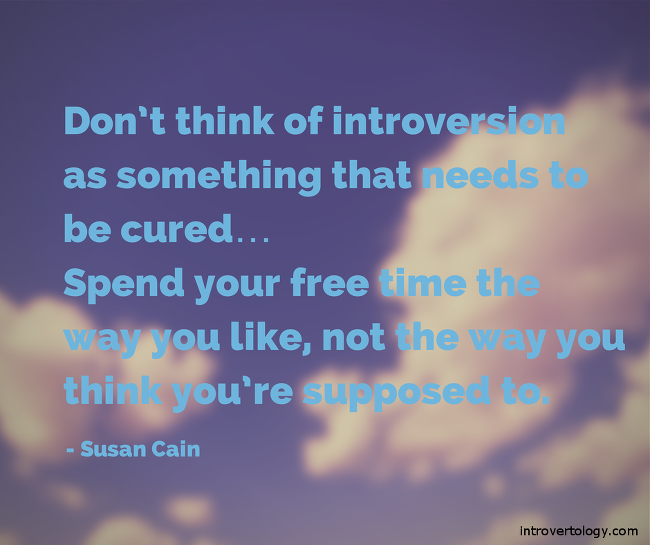I posted the following on Facebook the other day:
You don’t need to use an excuse when declining an invitation. It’s ok to just say “No thank you,” or “No thank you, but thanks for inviting me.” If the person asks “Why?” you have an excellent opportunity to discuss your introversion.
Saying “No thank you” without any made-up excuses may be hard, but it’s honest, and I sincerely think that the world will be a tiny bit better if we learned to just say no.
According to Laurie Helgoe, author of Introvert Power, introverts make up over 50% of the population. So let’s do some lazy math. Let’s say half of introverts are either gregarious, like to network, try to live like an extrovert, or think they will have enough energy on that day to go to the party. That leaves 25% of the population who really don’t want to go. That’s a lot of people, and potentially a lot of lies.
We may feel that we’re sparing the other person hurt feelings, but by giving a false excuse we’re normalizing lying and strange-ifying our occasional need to be solitary to recharge. We have the “right” to decide what we want to do with our time. The more people assume that the default answer will either be a Yes or an excuse, the less room there is for solitary introversion to be seen as normal. And by saying No you’re taking control of your life and your introversion.
“But I’ll hurt the person’s feelings,” you may be thinking. And you may be right. However, in the long run it’s better to be honest and deal with the consequences than lie and perpetuate of the myth that most people are extroverted and that everyone loves going to tons of parties.
If you go with the simple “No thank you,” you may be asked “Why?” This is a good opportunity to mention your introversion. You don’t need to give a long speech, just say something like “I’m an introvert and will probably want some downtime that weekend. By the way, have you seen Susan Cain’s TED talk (or, “Have you read Quiet?”).
That said, if you’re dealing with a very sensitive person, or if just saying no is too much of a stretch, try an honest excuse:
“Sorry, parties stress me out, but thanks for inviting me.”
“Not this time, sorry, but please invite me again.” (Best for gregarious introverts who may actually like to go to the next one)
“Thank you for thinking of me, but I’m an introvert and I have too many plans for that week/month already.”
“Thank you for thinking of me, but it’s been crazy at work and I just need to take it easy this weekend.”
“I really need a day to myself, but thanks for inviting me.”
“Thanks for inviting me, but I’m a solitary introvert.”
“No thanks, I’m more a small group of friends person. Say, you want to go out for lunch next week?”
I know it’s hard to be an introvert revolutionary, but I feel like we’ll all benefit by being honesty (but polite) and by owning our introversion.


I’m not sure this excuse would go well. “No sorry, I’m a solitary introvert” // “Errr, owwkayy… (what a weirdo).” *never contacts you again ever*
Hi Al. There’s a lot of variety within the introvert community, so each individual quote won’t appeal to every introvert. Many introverts are solitary and would be fine not being contacted by a certain person again.
Al, the advice above didn’t suggest apologizing (“sorry”) and didn’t recommend offering an explanation “I’m a solitary introvert” unless the asker probes. So you’re critiquing an approach that wasn’t recommended.
Declining someone’s offer can be construed as a rejection. Some inviters may try to twist a graciously declined invitation into rebuff. But that is a tactic. It can cause the invitee to over-react and say Yes for the wrong reasons. I first question is to ask oneself – am I interested. There are various possible answers: 1) I am not interested now, but I might want to say yes to an offer like this in the future; 2) I am not interested in this thing right now, and probably won’t be – but I am willing to move the relationship closer in other ways; 3) I am not interested at all, and I want to maintain – or perhaps increase – my social distance from the offerer.
For each case there’s a way to say no appropriately, and although the responses differ, they have a similar structure. Start each with an acknowledgement of the offer, “Wow, that’s nice of you to think of me for XYZ event.” Then don’t rush it. Wait a beat for your appreciation to sink in. Then reveal your choice: ranging from “It does sound like fun, but I don’t think so” to “I bet you’ll have a ball, but I’m more into XYZ – maybe we could do that some other time” or – more distantly – “That’s really not my thing. But I hope you have a great time!”
Optionally, follow your decision with some explanation. Remember – many experts say skip this step. Others say it’s okay to provide some explanation, but avoid lies and avoid self-deprecation. Responses can range from: “I’m just chilling this weekend” to “You probably noticed I’m an introvert” to “Some people don’t notice right away, but I’m an introvert who needs my solitary time.”
But always end by setting an expectation about future interactions. Examples range from “Ask me next time, I might say Yes” to “Let’s look for other things to do that we might both enjoy” to “I pretty much keep to myself” to “Let’s keep things as they are – it’s nice that we work together”.
Thank you for your wonderful response, John!
Help. What to do when you’re spending time with an introvert and instead of telling you the truth– that he wants to be alone, he gives lame excuses…that he’s working. And, he can only see you on Sundays between 4-9 pm?
Do I confront him or let him be?
We’ve been spending time together for 7 years.
He has a lot of rules.
Hi Lori. Sorry it’s taken me a while to respond.
So you’re sure that “working” is an excuse and not the truth? Some people prioritize work before most everything, including spending times with others. I work a lot, including on weekends.
Instead of confronting just yet I think it would be better if you could start with asking him about what it means to be an introvert – not grilling him, or challenging what he says, but honestly trying to understand the way he sees the world. From there, build the foundations of a relationship where he doesn’t feel the need to lie.
The fact that you think he’s lying suggests to me that either he doesn’t think you can understand him, or you don’t understand him and don’t trust his reasons. I would create room for more trust and understanding before confronting.